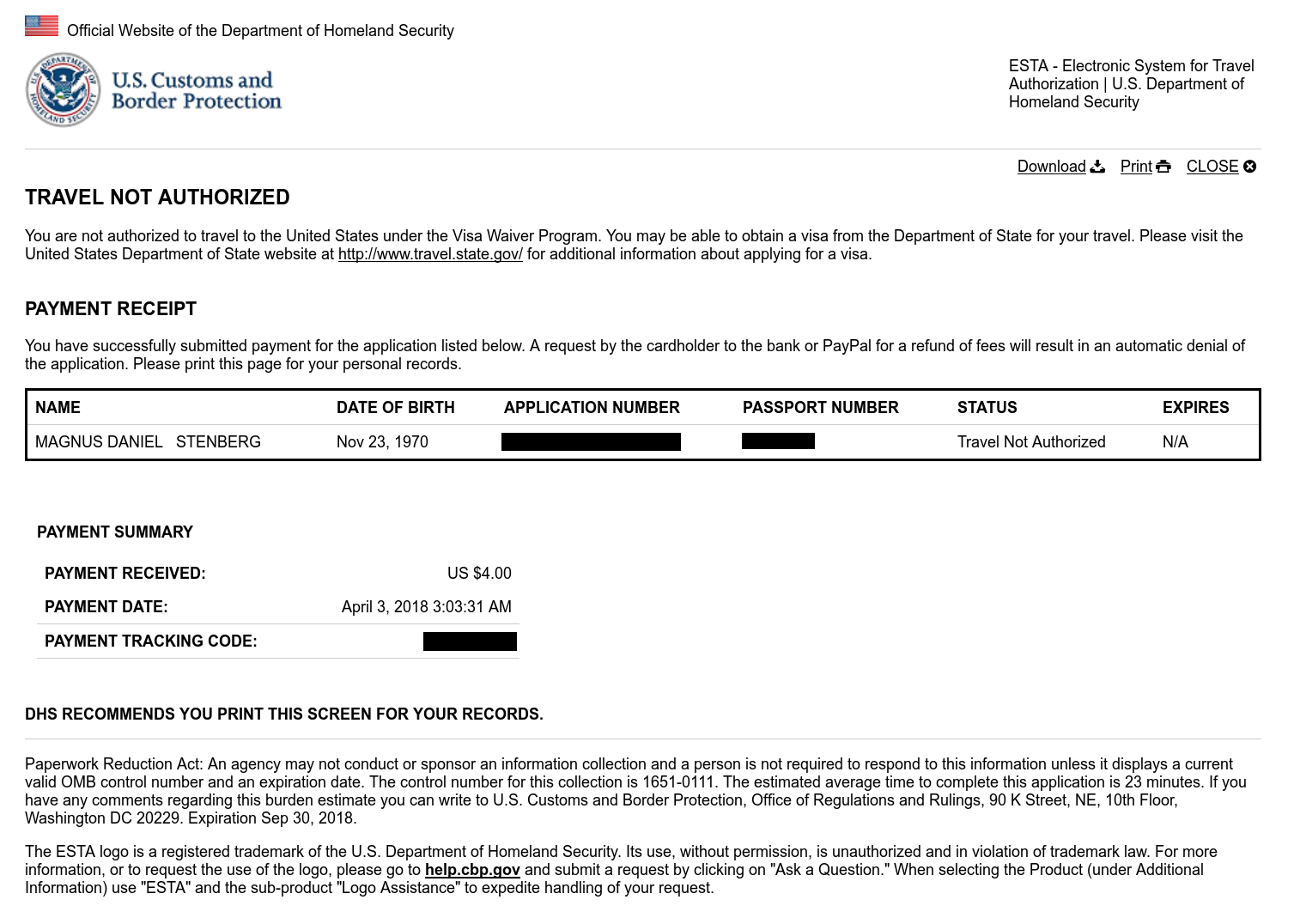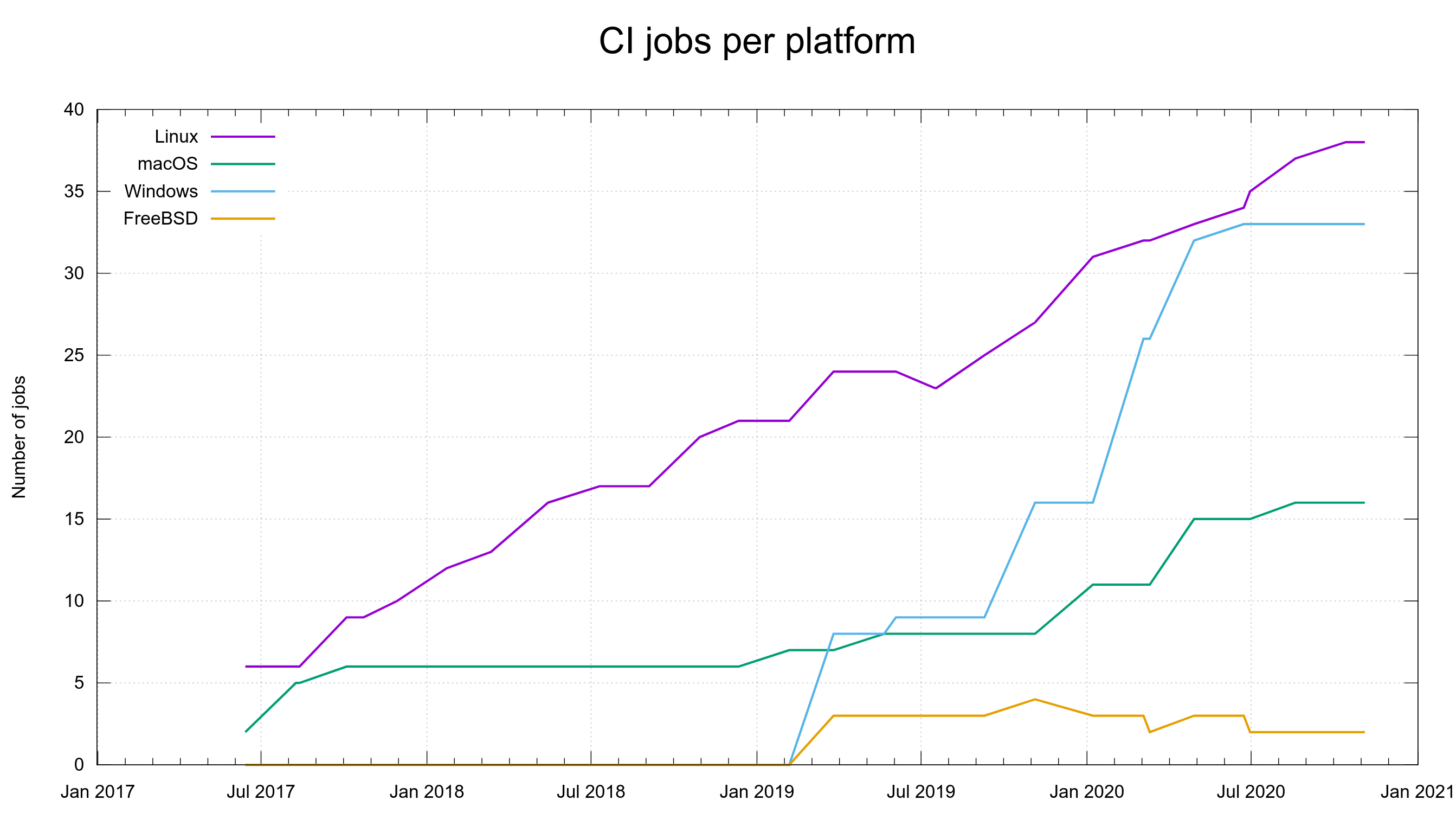
Embroidered and put on the kitchen wall, on a mug or just as words of wisdom to bring with you in life?
Here’s the complete timeline of events. From my first denial to travel to the US until I eventually received a tourist visa. And then I can’t go anyway.
I spent a week on Hawaii with Mozilla – my employer at the time. This was my 12th visit to the US over a period of 19 years. I went there on ESTA, the visa waiver program Swedish citizens can use. I’ve used it many times, there was nothing special this time. The typical procedure with ESTA is that we apply online: fill in a form, pay a 14 USD fee and get a confirmation within a few days that we’re good to go.

In the early morning one day by the check-in counter at Arlanda airport in Sweden, I was refused to board my flight. Completely unexpected and out of the blue! I thought I was going to San Francisco via London with British Airways, but instead I had to turn around and go back home – slightly shocked. According to the lady behind the counter there was “something wrong with my ESTA”. I used the same ESTA and passport as I used just fine back in December 2016. They’re made to last two years and it had not expired.

People engaged by Mozilla to help us out could not figure out or get answers about what the problem was (questions and investigations were attempted both in the US and in Sweden), so we put our hopes on that it was a human mistake somewhere and decided to just try again next time.
I missed the following meeting (in December 2017) for other reasons but in the summer of 2018 another Mozilla all-hands meeting was coming up (in Texas, USA this time) so I went ahead and applied for a new ESTA in good time before the event – as I was a bit afraid there was going to be problems. I was right and I got denied ESTA very quickly. “Travel Not Authorized”.

Gaaah. It meant it was no mistake last year, they actually mean this. I switched approach and instead applied for a tourist visa. I paid 160 USD, filled in a ridiculous amount of information about me and my past travels over the last 15 years and I visited the US embassy for an in-person interview and fingerprinting.

This is day 0 in the visa process, 296 days after I was first stopped at Arlanda.
I missed the all-hands meeting in San Francisco when I didn’t get the visa in time.
I quit Mozilla, so I then had no more reasons to go to their company all-hands…
A year passed. “someone is working on it” the embassy email person claimed when I asked about progress.
I emailed the embassy to query about the process

The reply came back quickly:
Dear Sir,
All applications are processed in the most expeditious manner possible. While we understand your frustration, we are required to follow immigration law regarding visa issuances. This process cannot be expedited or circumvented. Rest assured that we will contact you as soon as the administrative processing is concluded.
Another year had passed and I had given up all hope. Now it turned into a betting game and science project. How long can they actually drag out this process without saying either yes or no?
A friend of mine, a US citizen, contacted his Congressman – Gerry Connolly – about my situation and asked for help. His office then subsequently sent a question to the US embassy in Stockholm asking about my case. While the response that arrived on September 17 was rather negative…
your case is currently undergoing necessary administrative processing and regrettably it is not possible to predict when this processing will be completed.
… I think the following turn of events indicates it had an effect. It unclogged something.
After 889 days since my interview on the embassy (only five days after the answer to the congressman), the embassy contacted me over email. For the first time since that April day in 2018.
Your visa application is still in administrative processing. However, we regret to inform you that because you have missed your travel plans, we will require updated travel plans from you.
My travel plans – that had been out of date for the last 800 days or so – suddenly needed to be updated! As I was already so long into this process and since I feared that giving up now would force me back to square one if I would stop now and re-attempt this again at a later time, I decided to arrange myself some updated travel plans. After all, I work for an American company and I have a friend or two there.
I replied to the call for travel plan details with an official invitation letter attached, inviting me to go visit my colleagues at wolfSSL signed by our CEO, Larry. I really want to do this at some point, as I’ve never met most of them so it wasn’t a made up reason. I could possibly even get some other friends to invite me to get the process going but I figured this invite should be enough to keep the ball rolling.
I got another email. Now at 910 days since the interview. The embassy asked for my passport “for further processing”.
I posted my passport to the US embassy in Stockholm. I also ordered and paid for “return postage” as instructed so that they would ship it back to me in a safe way.
At 10:30 in the morning my phone lit up and showed me a text telling me that there’s an incoming parcel being delivered to me, shipped from “the Embassy of the United State” (bonus points for the typo).

I received my passport. Inside, there’s a US visa that is valid for ten years, until November 2030.
As a bonus, the visa also comes with a NIE (National Interest
Exception) that allows me a single entry to the US during the PP (Presidential Proclamations) – which is restricting travels to the US from the European Schengen zone. In other words: I am actually allowed to travel right away!
The timing is fascinating. The last time I was in the US, Trump hadn’t taken office yet and I get the approved visa in my hands just days after Biden has been announced as the next president of the US.
Covid-19 is still over us and there’s no end in sight of the pandemic. I will of course not travel to the US or any other country until it can be deemed safe and sensible.
When the pandemic is under control and traveling becomes viable, I am sure there will be opportunities. Hopefully the situation will improve before the visa expires.
All my family and friends, in the US and elsewhere who have supported me and cheered me up through this entire process. Thanks for keeping inviting me to fun things in the US even though I’ve not been able to participate. Thanks for pushing for events to get organized outside of the US! I’m sorry I’ve missed social gatherings, a friend’s marriage and several conference speaking opportunities. Thanks for all the moral support throughout this long journey of madness.
A special thanks go to David (you know who you are) for contacting Gerry Connolly’s office. I honestly think this was the key event that finally made things move in this process.
Every now and then I get questions on how to work with git in a smooth way when developing, bug-fixing or extending curl – or how I do it. After all, I work on open source full time which means I have very frequent interactions with git (and GitHub). Simply put, I work with git all day long. Ordinary days, I issue git commands several hundred times.
I have a very simple approach and way of working with git in curl. This is how it works.
I use git almost exclusively from the command line in a terminal. To help me see which branch I’m working in, I have this little bash helper script.
brname () {
a=$(git rev-parse --abbrev-ref HEAD 2>/dev/null)
if [ -n "$a" ]; then
echo " [$a]"
else
echo ""
fi
}
PS1="\u@\h:\w\$(brname)$ "
That gives me a prompt that shows username, host name, the current working directory and the current checked out git branch.
In addition: I use Debian’s bash command line completion for git which is also really handy. It allows me to use tab to complete things like git commands and branch names.
I of course also have my customized ~/.gitconfig file to provide me with some convenient aliases and settings. My most commonly used git aliases are:
st = status --short -uno
ci = commit
ca = commit --amend
caa = commit -a --amend
br = branch
co = checkout
df = diff
lg = log -p --pretty=fuller --abbrev-commit
lgg = log --pretty=fuller --abbrev-commit --stat
up = pull --rebase
latest = log @^{/RELEASE-NOTES:.synced}..
The ‘latest’ one is for listing all changes done to curl since the most recent RELEASE-NOTES “sync”. The others should hopefully be rather self-explanatory.
The config also sets gpgsign = true, enables mailmap and a few other things.
The main curl development is done in the single curl/curl git repository (primarily hosted on GitHub). We keep the master branch the bleeding edge development tree and we work hard to always keep that working and functional. We do our releases off the master branch when that day comes (every eight weeks) and we provide “daily snapshots” from that branch, put together – yeah – daily.
When merging fixes and features into master, we avoid merge commits and use rebases and fast-forward as much as possible. This makes the branch very easy to browse, understand and work with – as it is 100% linear.
When I start something new, like work on a bug or trying out someone’s patch or similar, I first create a local branch off master and work in that. That is, I don’t work directly in the master branch. Branches are easy and quick to do and there’s no reason to shy away from having loads of them!
I typically name the branch prefixed with my GitHub user name, so that when I push them to the server it is noticeable who is the creator (and I can use the same branch name locally as I do remotely).
$ git checkout -b bagder/my-new-stuff-or-bugfix
Once I’ve reached somewhere, I commit to the branch. It can then end up one or more commits before I consider myself “done for now” with what I was set out to do.
I try not to leave the tree with any uncommitted changes – like if I take off for the day or even just leave for food or an extended break. This puts the repository in a state that allows me to easily switch over to another branch when I get back – should I feel the need to. Plus, it’s better to commit and explain the change before the break rather than having to recall the details again when coming back.
“git stash” is therefore not a command I ever use. I rather create a new branch and commit the (temporary?) work in there as a potential new line of work.
Yes I am the lead developer of the project but I still maintain the same work flow as everyone else. All changes, except the most minuscule ones, are done as pull requests on GitHub.
When I’m happy with the functionality in my local branch. When the bug seems to be fixed or the feature seems to be doing what it’s supposed to do and the test suite runs fine locally.
I then clean up the commit series with “git rebase -i” (or if it is a single commit I can instead use just “git commit --amend“).
The commit series should be a set of logical changes that are related to this change and not any more than necessary, but kept separate if they are separate. Each commit also gets its own proper commit message. Unrelated changes should be split out into its own separate branch and subsequent separate pull request.
git push origin bagder/my-new-stuff-or-bugfix
On GitHub, I then make the newly pushed branch into a pull request (aka “a PR”). It will then become visible in the list of pull requests on the site for the curl source repository, it will be announced in the #curl IRC channel and everyone who follows the repository on GitHub will be notified accordingly.
Perhaps most importantly, a pull request kicks of a flood of CI jobs that will build and test the code in numerous different combinations and on several platforms, and the results of those tests will trickle in over the coming hours. When I write this, we have around 90 different CI jobs – per pull request – and something like 8 different code analyzers will scrutinize the change to see if there’s any obvious flaws in there.

Most contributors who would work on curl would not do like me and make the branch in the curl repository itself, but would rather do them in their own forked version instead. The difference isn’t that big and I could of course also do it that way.
As it will take some time to get the full CI results from the PR to come in (generally a few hours), I switch over to the next branch with work on my agenda. On a normal work-day I can easily move over ten different branches, polish them and submit updates in their respective pull-requests.
I can go back to the master branch again with ‘git checkout master‘ and there I can “git pull” to get everything from upstream – like when my fellow developers have pushed stuff in the mean time.
If a reviewer or a CI job find a mistake in one of my PRs, that becomes visible on GitHub and I get to work to handle it. To either fix the bug or discuss with the reviewer what the better approach might be.
Unfortunately, flaky CI jobs is a part of life so very often there ends up one or two red markers in the list of CI jobs that can be ignored as the test failures in them are there due to problems in the setup and not because of actual mistakes in the PR…
To get back to my branch for that PR again, I “git checkout bagder/my-new-stuff-or-bugfix“, and fix the issues.
I normally start out by doing follow-up commits that repair the immediate mistake and push them on the branch:
git push origin bagder/my-new-stuff-or-bugfix
If the number of fixup commits gets large, or if the follow-up fixes aren’t small, I usually end up doing a squash to reduce the number of commits into a smaller, simpler set, and then force-push them to the branch.
The reason for that is to make the patch series easy to review, read and understand. When a commit series has too many commits that changes the previous commits, it becomes hard to review.
When the pull request is ripe for merging (independently of who authored it), I switch over to the master branch again and I merge the pull request’s commits into it. In special cases I cherry-pick specific commits from the branch instead. When all the stuff has been yanked into master properly that should be there, I push the changes to the remote.
Usually, and especially if the pull request wasn’t done by me, I also go over the commit messages and polish them somewhat before I push everything. Commit messages should follow our style and mention not only which PR that it closes but also which issue it fixes and properly give credit to the bug reporter and all the helpers – using the right syntax so that our automatic tools can pick them up correctly!
As already mentioned above, I merge fast-forward or rebased into master. No merge commits.
There’s a button GitHub that says “rebase and merge” that could theoretically be used for merging pull requests. I never use that (and if I could, I’d disable/hide it). The reasons are simply:
The downside with not using the merge button is that the message in the PR says “closed by [hash]” instead of “merged in…” which causes confusion to a fair amount of users who don’t realize it means that it actually means the same thing! I consider this is a (long-standing) GitHub UX flaw.
If the branch has nothing to be kept around more, I delete the local branch again with “git branch -d [name]” and I remove it remotely too since it was completely merged there’s no reason to keep the work version left.
At any given point in time, I have some 20-30 different local branches alive using this approach so things I work on over time all live in their own branches and also submissions from various people that haven’t been merged into master yet exist in branches of various maturity levels. Out of those local branches, the number of concurrent pull requests I have in progress can be somewhere between just a few up to ten, twelve something.
Not strictly related, but in order to keep interested people informed about what’s happening in the tree, we sync the RELEASE-NOTES file every once in a while. Maybe every 5-7 days or so. It thus becomes a file that explains what we’ve worked on since the previous release and it makes it well-maintained and ready by the time the release day comes.
To sync it, all I need to do is:
$ ./scripts/release-notes.pl
Which makes the script add suggested updates to it, so I then load the file into my editor, remove the separation marker and all entries that don’t actually belong there (as the script adds all commits as entries as it can’t judge the importance).
When it looks okay, I run a cleanup round to make it sort it and remove unused references from the file…
$ ./scripts/release-notes.pl cleanup
Then I make sure to get a fresh list of contributors…
$ ./scripts/contributors.sh
… and paste that updated list into the RELEASE-NOTES. Finally, I get refreshed counters for the numbers at the top of the file by running
$ ./scripts/delta
Then I commit the update (which needs to have the commit message RELEASE-NOTES: synced“) and push it to master. Done!
The most up-to-date version of RELEASE-NOTES is then always made available on https://curl.se/dev/release-notes.html
Picture by me, taken from the passenger seat on a helicopter tour in 2011.
Good things come to those who wait?
When I created and started hosting the first websites for curl I didn’t care about the URL or domain names used for them, but after a few years I started to think that maybe it would be cool to register a curl domain for its home. By then it was too late to find an available name under a “sensible” top-level domain and since then I’ve been on the lookout for one.
So yes, I’ve administrated every machine that has ever hosted the curl web site going all the way back to the time before we called the tool curl. I’m also doing most of the edits and polish of the web content, even though I’m crap at web stuff like CSS and design. So yeah, I consider it my job to care for the site and make sure it runs smooth and that it has a proper (domain) name.
The first ever curl web page was hosted on “www.fts.frontec.se/~dast/curl” in the late 1990s (snapshot). I worked for the company with that domain name at the time and ~dast was the location for my own personal web content.
The curl website moved to its first “own home”, with curl.haxx.nu in August 1999 (snapshot) when we registered our first domain and the .nu top-level domain was available to us when .se wasn’t.
We switched from curl.haxx.nu to curl.haxx.se in the summer of 2000 (when finally were allowed to register our name in the .se TLD) (snapshot).
The name “haxx” in the domain has been the reason for many discussions and occasional concerns from users and overzealous blocking-scripts over the years. I’ve kept the curl site on that domain since it is the name of one of the primary curl sponsors and partly because I want to teach the world that a particular word in a domain is not a marker for badness or something like that. And of course because we have not bought or been provided a better alternative.
Haxx is still the name of the company I co-founded back in 1997 so I’m also the admin of the domain.
I’ve looked for and contacted owners of curl under many different TLDs over the years but most have never responded and none has been open for giving up their domains. I’ve always had an extra attention put on curl.se because it is in the Swedish TLD, the same one we have for Haxx and where I live.
The first record on archive.org of anyone using the domain curl.se for web content is dated August 2003 when the Swedish curling team “Härnösands CK” used it. They used the domain and website for a few years under this name. It can be noted that it was team Anette Norberg, which subsequently won two Olympic gold medals in the sport.
In September 2007 the site was renamed, still being about the sport curling but with the name “the curling girls” in Swedish (curlingtjejerna) which remained there for just 1.5 years until it changed again. “curling team Folksam” then populated the site with contents about the sport and that team until they let the domain expire in 2012. (Out of these three different curling oriented sites, the first one is the only one that still seems to be around but now of course on another domain.)
In early August 2012 the domain was registered to a new owner. I can’t remember why, but I missed the chance to get the domain then.
August 28 2012 marks the first date when curl.se is recorded to suddenly host a bunch of links to casino, bingo and gambling sites. It seems that whoever bought the domain wanted to surf on the good name and possible incoming links built up from the previous owners. For several years this crap was what the website showed. I doubt very many users ever were charmed by the content nor clicked on many links. It was ugly and over-packed with no real content but links and ads.
The last archive.org capture of the ad-filled site was done on October 2nd 2016. Since then, there’s been no web content on the domain that I’ve found. But the domain registration kept getting renewed.
In August 2019, I noticed that the domain was about to expire, and I figured it could be a sign that the owner was not too interested in keeping it anymore. I contacted the owner via a registrar and offered to buy it. The single only response I ever got was that my monetary offer was “too low”. I tried to up my bid, but I never got any further responses from the owner and then after a while I noticed that the domain registration was again renewed for another year. I went back to waiting.
In September 2020 the domain was again up for expiration and I contacted the owner again, this time asking for a price for which they would be willing to sell the domain. Again no response, but this time the domain actually went all the way to expiry and deletion, which eventually made it available “on the market” for everyone interested to compete for the purchase.
I entered the race with the help of a registrar that would attempt to buy the name when it got released. When this happens, when a domain name is “released”, it becomes a race between all the potential buyers who want the domain. It is a 4-letter domain that is an English word and easy pronounceable. I knew there was a big risk others would also be trying to get it.
In the early morning of October 19th 2020, the curl.se domain was released and in the race of getting the purchase… I lost. Someone else got the domain before me. I was sad. For a while, until I got the good news…
It turned out my friend Bartek Tatkowski had snatched the domain! After getting all the administrative things in order, Bartek graciously donated the domain to me and 15:00 on October 30 2020 I could enter my own name servers into the dedicated inputs fields for the domain, and configure it properly in our master and secondary DNS servers.
Starting on November 4, 2020 curl.se is the new official home site for the curl project. The curl.haxx.se name will of course remain working for a long time more and I figure we can basically never shut it down as there are so many references to it spread out over the world. I intend to eventually provide redirects for most things from the old name to the new.
What about a www prefix? The jury is still out how or if we should use that or not. The initial update of the site (November 4) uses a www.curl.se host name in links but I’ve not done any automatic redirects to or from that. As the site is CDNed, and we can’t use CNAMEs on the apex domain (curl.se), we instead use anycast IPs for it – the net difference to users should be zero. (Fastly is a generous sponsor of the curl project.)
I also happen to own libcurl.se since a few years back and I’ll make sure using this name also takes you to the right place.
People repeatedly ask me. Names in the .dev domains are expensive. Registering curl.dev goes for 400 USD right now. curl.se costs 10 USD/year. I see little to no reason to participate in that business and I don’t think spending donated money on such a venture is a responsible use of our funds.
Image by truthseeker08 from Pixabay. Domain by Bartek Tatkowski.
HTTP Strict Transport Security (HSTS) is a standard HTTP response header for sites to tell the client that for a specified period of time into the future, that host is not to be accessed with plain HTTP but only using HTTPS. Documented in RFC 6797 from 2012.
The idea is of course to reduce the risk for man-in-the-middle attacks when the server resources might be accessible via both HTTP and HTTPS, perhaps due to legacy or just as an upgrade path. Every access to the HTTP version is then a risk that you get back tampered content.
These headers have been supported by the popular browsers for years already, and they also have a system setup for preloading a set of sites. Sites that exist in their preload list then never get accessed over HTTP since they know of their HSTS state already when the browser is fired up for the first time.
The entire .dev top-level domain is even in that preload list so you can in fact never access a web site on that top-level domain over HTTP with the major browsers.
Starting in curl 7.74.0, curl has experimental support for HSTS. Experimental means it isn’t enabled by default and we discourage use of it in production. (Scheduled to be released in December 2020.)
You instruct curl to understand HSTS and to load/save a cache with HSTS information using --hsts <filename>. The HSTS cache saved into that file is then updated on exit and if you do repeated invokes with the same cache file, it will effectively avoid clear text HTTP accesses for as long as the HSTS headers tell it.
I envision that users will simply use a small hsts cache file for specific use cases rather than anyone ever really want to have or use a “complete” preload list of domains such as the one the browsers use, as that’s a huge list of sites and for most use cases just completely unnecessary to load and handle.
Possibly, this feature is more useful and appreciated by applications that use libcurl for HTTP(S) transfers. With libcurl the application can set a file name to use for loading and saving the cache but it also gets some added options for more flexibility and powers. Here’s a quick overview:
CURLOPT_HSTS – lets you set a file name to read/write the HSTS cache from/to.
CURLOPT_HSTS_CTRL – enable HSTS functionality for this transfer
CURLOPT_HSTSREADFUNCTION – this callback gets called by libcurl when it is about to start a transfer and lets the application preload HSTS entries – as if they had been read over the wire and been added to the cache.
CURLOPT_HSTSWRITEFUNCTION – this callback gets called repeatedly when libcurl flushes its in-memory cache and allows the application to save the cache somewhere and similar things.
I trust you understand that I’m very very keen on getting feedback on how this works, on the API and your use cases. Both negative and positive. Whatever your thoughts are really!
The other day we celebrated everything curl turning 5 years old, and not too long after that I got myself this printed copy of the Chinese translation in my hands!
This version of the book is available for sale on Amazon and the translation was done by the publisher.
The book’s full contents are available on github and you can read the English version online on ec.haxx.se.
If you would be interested in starting a translation of the book into another language, let me know and I’ll help you get started. Currently the English version consists of 72,798 words so it’s by no means an easy feat to translate! My other two other smaller books, http2 explained and HTTP/3 explained have been translated into twelve(!) and ten languages this way (and there might be more languages coming!).


Unfortunately I don’t read Chinese so I can’t tell you how good the translation is!
I work full time on open source and this is how.
I started learning how to program in my teens, well over thirty years ago and I’ve worked as a software engineer and developer since the early 1990s. My first employment as a developer was in 1993. I’ve since worked for and with lots of companies and I’ve worked on a huge amount of (proprietary) software products and devices over many years. Meaning: I certainly didn’t start my life open source. I had to earn it.
When I was 20 years old I did my (then mandatory) military service in Sweden. After having endured that, I applied to the university while at the same time I was offered a job at IBM. I hesitated, but took the job. I figured I could always go to university later – but life took other turns and I never did. I didn’t do a single day of university. I haven’t regretted it.

I learned to code in the mid 80s on a Commodore 64 and software development has been one of my primary hobbies ever since. One thing it taught me well, that I still carry with me, is to spend a few hours per day in front of my home computer.
In the spring of 1998 I renamed my little pet project of the time again and I released the first ever curl release. I have told this story many times, but since then I have spent two hours or so of my spare time on that project – every day for over twenty years. While still working as a software engineer by day.

Over time, curl gradually grew popular and attracted more users. There was no sudden moment in time where I struck gold and everything took off. It was just slowly gaining ground while me and my fellow project members kept improving and polishing curl. At some point in time I happened to notice that curl and libcurl would appear in more and more acknowledgements and in open source license collections in products and devices.
It was still just a spare time project.
I’d like to emphasize that I worked as a contract and consultant developer for many years (over 20!), primarily on proprietary software and custom solutions, before I managed to land myself a position where I could primarily write open source as part of my job.
In 2014 I joined Mozilla and got the opportunity to work on the open source project Firefox for a living – and doing it entirely from my home. This was the first time in my career I actually spent most of my days on code that was made public and available to the world. They even allowed me to spend a part of my work hours on curl, even if that didn’t really help them and curl was not a fundamental part of any Mozilla work or products. It was still great.
I landed that job for Mozilla a lot thanks to my many years and long experience with portable network coding and running a successful open source project at this level.
My work setup with Mozilla made it possible for me to spend even more time on curl, apart from the (still going) two daily spare time hours. Nobody at Mozilla cared much about (my work with) curl and no one there even asked me about it. I worked on Firefox for a living.
For anyone wanting to do open source as part of their work, getting a job at a company that already does a lot of open source is probably the best path forward. Even if that might not be easy either, and it might also mean that you would have to accept working on some open source projects that you might not yourself be completely sold on.
In late 2018 I quit Mozilla, in part because I wanted to try to work with curl “for real” (and part other reasons that I’ll leave out here). curl was then already over twenty years old and was used more than ever before.
I now work for wolfSSL. We sell curl support and related services to companies. Companies pay wolfSSL, wolfSSL pays me a salary and I get food on the table. This works as long as we can convince enough companies that this is a good idea.
The vast majority of curl users out there of course don’t pay anything and will never pay anything. We just need a small number of companies to do it – and it seems to be working. We help customers use curl better, we make curl better for them and we make them ship better products this way. It’s a win win. And I can work on open source all day long thanks to this.
A normal day in the work week, I get up before 7 in the morning and I have breakfast with my family members: my wife and my two kids. Then I grab my first cup of coffee for the day and take the thirteen steps up the stairs to my “office”.
I sit down in front of my main development (Linux) machine with two 27″ screens and get to work.

I lead the curl project. It means many questions and decisions fall down to me to have an opinion about or say on, and it’s a priority for me to make sure that I unblock such situations as soon as possible so that developers wanting to do things with curl can continue doing that.
Thus, I read and respond to email about curl all hours I’m awake and have network access. Of course incoming messages actually rarely require immediate responses and then I can queue them up and instead do them later. I also try to read and assess all new incoming curl issues as soon as possible to see if there’s something urgent I should deal with immediately, or otherwise figure out how to deal with them going forward.
I usually have a set of bugs or features to work on so when there’s no alarming email or GitHub issue left, I context-switch over to the curl source code tree and the particular branch in which I work on right now. I typically have 20-30 different branches of development of various stages and maturity going on. If I get stuck on something, or if I create a pull-request for one of them that needs time to get all the CI jobs done, I switch over to one of the others.
Customers and their needs of course have priority when I decide what to work on. The exception would perhaps be security vulnerabilities or other really serious bugs being reported, but thankfully they are rare. But after that, I go by ear and work on what I think is fun and what I think users might appreciate.
If I want to go forward with something, for my own sake or for a customer’s, and that entails touching or improving other software in other projects, then I don’t shy away from submitting pull requests for them – or at least filing an issue.
Yes, I still spend my spare time hours on open source, mostly curl. This means I often end up spending 50-55 hours per week on curl and curl related activities. But I don’t count or measure work hours and I rarely have to report any to anyone. This is a work of love.
Lots of people will say that they don’t have time because of life, family, kids etc. I have of course been very fortunate over the years to have had the opportunity and ability to spend all this time on what I want to do, but let’s not forget that people in general spend lots of time on their hobbies; on watching TV, on playing computer games and on socializing with friends and why not: to sleep. If you cut down on all of those things (yes, including the sleeping) there could very well be opportunities. It’s often a question of priorities. I’ve made spare time development a priority in my life.
Any company that uses curl or libcurl – and they are plenty – could benefit from buying support from us instead of wasting their own time and resources. We at wolfSSL are probably much better at curl already and we can find and fix the issues much faster, which ends up cheaper and better long-term.
The top photo is taken by Anja Stenberg, my wife. It’s me in a local forest, summer 2020.
The main physical server (we call it giant) we’ve been using at Haxx for a very long time to host sites and services for 20+ domains and even more mailing lists. The machine – a physical one – has been colocated in an ISP server room for over a decade and has served us very well. It has started to show its age.
Some of the more known sites and services it hosts are perhaps curl, c-ares, libssh2 and this blog (my entire daniel.haxx.se site). Some of these services are however primarily accessed via fronting CDN servers.
giant is a physical Dell PowerEdge 1850 server from 2005, which has undergone upgrades of CPU, disks and memory through the years.
giant featured an Intel X3440 Xeon CPU at 2.53GHz with 8GB of ram when decommissioned.

The new host is of course entirely virtual and we’ve finally taken the step into the modern world of VPSes. The new machine is hosted by the same provider as before but as an entirely new instance.
We’ve upgraded the OS, all packages and we’ve remodeled how we run the web services and all our jobs and services from before have been moved into this new fresh server in an attempt to leave some of the worst legacies behind.
The former server will not be used anymore and will be powered down and sent for recycling.
We’ve tried really hard to make this transition transparent and ideally not many users will notice anything or have a reason to bother about this, but of course we also realize that we probably have not managed this to 100% perfection. If you detect something on any of the services we run that used to work or exist but isn’t anymore, do let us know so that become aware of it and can work on a fix!
This site (daniel.haxx.se) already moved weeks ago and nobody noticed. The curl site changed on October 23 and are much more likely to get glitches because of all the many more scripts and automatic things setup for it. Both sites are served via Fastly so ordinary users will not detect or spot that there’s a new host in the back end.
Today, exactly three years ago, I received flowers, money and a gold medal at a grand prize ceremony that will forever live on in my mind and memory. I was awarded the Polhem Prize for my decades of work on curl. The prize itself was handed over to me by no one else than the Swedish king himself. One of the absolute top honors I can imagine in my little home country.
In some aspects, my life is divided into the life before this event and the life after. The prize has even made little me being presented on a poster in the Technical Museum in Stockholm. The medal itself still sits on my work desk and if I just stop starring at my monitors for a moment and glance a little over to the left – I can see it. I think the prize made my surroundings, my family and friends get a slightly different view and realization of what I actually do all these hours in front of my screens.
In the tree years since I received the prize, we’ve increased the total number of contributors and authors in curl by 50%. We’ve done over 3,700 commits and 25 releases since then. Upwards and onward.
Life moved on. It was not “peak curl”. There was no “prize curse” that left us unable to keep up the pace and development. It was possibly a “peak life moment” there for me personally. As an open source maintainer, I can’t imagine many bigger honors or awards to come my way ever again, but I’m not complaining. I got the prize and I still smile when I think about it.

In international curling competitions, each team is given 73 minutes to complete all of its throws. Welcome to curl 7.73.0.
the 195th release
9 changes
56 days (total: 8,2XX)
135 bug fixes (total: 6,462)
238 commits (total: 26,316)
3 new public libcurl function (total: 85)
1 new curl_easy_setopt() option (total: 278)
2 new curl command line option (total: 234)
63 contributors, 31 new (total: 2,270)
35 authors, 17 new (total: 836)
0 security fix (total: 95)
0 USD paid in Bug Bounties (total: 2,800 USD)
We have to look back almost two years to find a previous release packed with more new features than this! The nine changes we’re bringing to the world this time are…
--output-dirTell curl where to store the file when you use -o or -O! Requested by users for a long time. Now available!
.curlrc in $XDG_CONFIG_HOMEIf this environment variable is set and there’s a .curlrc in there, it will now be used in preference to the other places curl will look for it.
--help has categoriesThe huge wall of text that --help previously gave us is now history. “curl --help” will now only show a few important options and the rest is provided if you tell curl which category you want to list help for. Requested by users for a long time.
With three new functions, libcurl now provides an API for getting meta-data and information about all existing easy options that an application (possibly via a binding) can set for a transfer in libcurl.
We’ve introduced a new error code, and what makes this a little extra note-worthy besides just being a new way to signal a particular error, is that applications that receive this error code can also query libcurl for extended error information about what exactly in the proxy use or handshake that failed. The extended explanation is extracted with the new CURLINFO_PROXY_ERROR.
This is the first curl release where MQTT support is enabled by default. We’ve had it marked experimental for a while, which had the effect that virtually nobody actually used it, tried it or even knew it existed. I’m very eager to get some actual feedback on this…
The “quote” functionality in curl which can sends custom commands to the SFTP server to perform various instructions now also supports atime and mtime for setting the access and modification times of a remote file.
The “known hosts” feature is a SSH “thing” that lets an application get told if libcurl connects to a host that isn’t already listed in the known hosts file and what to do about it. This new feature lets the application return CURLKHSTAT_FINE_REPLACE which makes libcurl treat the host as “fine” and it will then replace the host key for that host in the known hosts file.
Assuming you use the supported backend, you can now select which curves libcurl should use in the TLS handshake, with CURLOPT_SSL_EC_CURVES for libcurl applications and with --curves for the command line tool.
As always, here follows a small selection of the many bug-fixes done this cycle.
Born in May 2001, this script was introduced to build configure etc so that you can run configure etc, when you’re building code straight from git (even if it was CVS back in 2001).
Starting now, the script just runs ‘autoreconf -fi‘ and no extra custom magic is needed.
Our homegrown code style checker got better and now also verifies:
do { } while“if(!true) expressions// comments are not allowed even on column 0The text that was previously output, saying that the cmake build has glitches has been removed. Not really because it has gotten much better, but to not scare people away, let them proceed and use cmake and then report problems and submit pull requests that fix them!
The libcurl internal system for doing “dynamic buffers” (strings) is now also used by the curl tool and a lot of custom realloc logic has been converted over.
The --retry option didn’t work when doing parallel transfers, and when fixed, the retry delay option didn’t work either so that was also fixed!
We changed the handling of saving and loading etags a little bit, so that it now stores and loads the full etag contents and not just the bytes between double quotes. This has the added benefit that the etag functionality now also works with weak etags and when working with servers that don’t really follow the syntax rules for etags.
Getting a 550 response back from a SIZE command will now make curl return at once saying the file is missing. Previously it would put that into the generic “SIZE doesn’t work” pool of errors, but that could lead to some inconsistent return codes.
Turns out that when uploading data to an FTP server, there’s a dedicated response code for the server to tell the client when the disk system is full (there was not room enough to store the file) and since there was also an existing libcurl return code for it, this new mapping thus made perfect sense…
The FTP code would previously wrongly consider a HTTPS proxy to euqal *using TLS” as if it was using TLS for its control channel, which made it wrongly use commands that are reserved for TLS connections.
Some adjustments were necessary to make sure the SCP and SFTP work when spoken over an HTTPS proxy. Also note that this fix is only done for the libssh2 backend (primarily because I didn’t find out to do it in the others when I did a quick check).
I blogged about this malloc reducing adventure separately. The command sending function in curl for FTP, IMAP, POP3 and SMTP now reuses the same memory buffer much better over a transfer’s lifetime.
One of the really nice benefits of “preprocessing” the text files and generate another file that is actually used for running tests, is that we now can provide meta-instructions to generate content when the test starts up. For example, we had tests that had a megabyte or several hundred kilobytes of text for test purposes, and how we can replace those with just a single %repeat% instruction. Makes test cases much smaller and much easier to read. %hex% can generate binary output given a hex string.
The test suite now knows which version of curl it tests, which means it can properly verify the User-Agent: headers in curl’s outgoing HTTP requests. We’ve previously had a filter system that would filter out such headers before comparing. Yours truly then got the pleasure of updating no less than 619 test cases to longer filter off that header for the comparison and instead use %VERSION!
Apparently version 2 has been supported in Windows since Windows 95…
Unless we’ve screwed up somewhere, the next release will be 7.74.0 and ship on December 9, 2020. We have several pending pull-requests already in the queue with new features and changes!